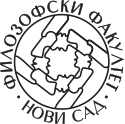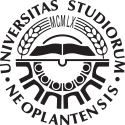15FLFL001 - Hellenic Philosophy
| Course specification | ||||
|---|---|---|---|---|
| Course title | Hellenic Philosophy | |||
| Acronym | 15FLFL001 | |||
| Study programme | Philosophy | |||
| Module | ||||
| Type of study | first degree undergraduate academic studies | |||
| Lecturer (for classes) | ||||
| Lecturer/Associate (for practice) | ||||
| Lecturer/Associate (for OTC) | ||||
| ESPB | 10.0 | Status | ||
| Condition | none | Oblik uslovljenosti | ||
| The goal | Hellenic philosophy is a spiritual and historical fundament of the integral philosophical tradition. In this subject, philosophy is established as a specific form of human spirit, the fundamental philosophical questions are asked and key philosophical terms and categories are formed. The aim of the course Hellenic philosophy is to familiarize students with the sense of ontologocal turnover in which the philosophy is creating as well as with key terms and ideals of ancient greek philosophers, on a general level and in particular important elaborations. The study of this cours should enable the understanding of an impact of the hellenic philosophical traditions which it has on the development of the latter philosophy, as one of the leading philosophical matrices of a whole west civilization. | |||
| The outcome | Formation of the students to overmaster the basic doctrines and terms of the Hellenic philosophy in both, systematic and historic way. Students acquire the skills of terminological communication with ancient heritage as well as insight in consequences of the westernization of classic Greek terms and ideas. | |||
| Contents | ||||
| Contents of lectures | The sources for observation of Greek philosophy; Mythology and philosophy (teogony and cosmogony; mythos and logos; eastern wisdom and Greek sophia); Culture of polis; Periodization of the geek philosophy; Creating of philosophical language; The seven wise men; „Physicists” of Milets; Pythagoras and Pythagoreans; Heraclitus; Eleatic school; Empedocles; Atomistic philosophy; Anaxagoras; Sophistic philosophy (sophos and sophistes; oppositions physis-nomos; Man as a measure| „Man is the measure off all things”); Socrates (irony and definition; the virtue is knowledge; the virtue is only one; Socrates as a founder of morality and ethics; Socratic schools); Plato and the Academy (Politeia and justice; Politeia and paideia; „the theory of forms| ideas” and allegory of the cave; the problem of cognition; the Plato’s psychology ; the Plato’s cosmology; the Plato’s critic of arts; the old Academy). | |||
| Contents of exercises | Seminar The analysis of original philosophical texts | |||
| Literature | ||||
| ||||
| Number of hours per week during the semester/trimester/year | ||||
| Lectures | Exercises | OTC | Study and Research | Other classes |
| 4 | 2 | |||
| Methods of teaching | Comparative method, interactive method (work on the original fragments and text analysis) | |||
| Knowledge score (maximum points 100) | ||||
| Pre obligations | Points | Final exam | Points | |
| Activites during lectures | 5 | Test paper | 20 | |
| Practical lessons | 0 | Oral examination | 50 | |
| Projects | 0 | |||
| Colloquia | 10 | |||
| Seminars | 15 | |||

